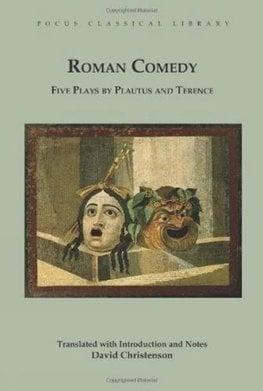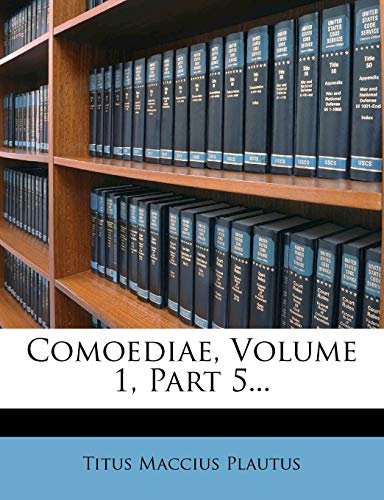Plautus Pseudolus Translation

Pseudolus Sparknotes
Pseudolus fuit ipsus. Actumst de me. Iam morior, Simo. Hercle te hau sinam emoriri, nisi mi argentum redditur, viginti minae. Atque etiam mihi aliae viginti minae. Auferen tu id praemium a me, quod promisi per iocum? Plautus The Latin Library The Classics Page. A Funny Thing Happened on the Way to the Forum, the hit Broadway musical, borrows much of its plot and even the name of its leading slave, Pseudolus (“Deceitful Dude”), from Plautus’ comedy. Although all the characters in Pseudolus speak Latin, they are meant to.
Pseudolus is a play by the. It is one of the earliest examples of. The play begins with the shortest prologue of any of the known plays of Plautus, though it is not known whether Plautus wrote this prologue himself or if it was added later. Pseudolus, was first shown in 191 B.C.
Which was a celebration for the Greek Goddess. The temple for worship of Rhea in Rome was completed during the same year in time for the festival. Plautus pulling his plays from Greek plays and influence, it is no wonder that he debuted this play during the Megalesian Festival.


This is a pre-1923 historical reproduction that was curated for quality. Quality assurance was conducted on each of these books in an attempt to remove books with imperfections introduced by the digitization process. Though we have made best efforts - the books may have occasional errors that do not impede the reading experience. We believe this work is culturally importan This is a pre-1923 historical reproduction that was curated for quality. Quality assurance was conducted on each of these books in an attempt to remove books with imperfections introduced by the digitization process.
Though we have made best efforts - the books may have occasional errors that do not impede the reading experience. We believe this work is culturally important and have elected to bring the book back into print as part of our continuing commitment to the preservation of printed works worldwide. The folly of boyhood love 10 November 2014 It was interesting to note that in the introduction they mentioned that the plot of this play was one of those really hackneyed plots in the Roman times.
That may be the case, but the fact that it has survived suggests that Plautus' take on the subject was a superior version of this well worn plot, or it simply could be the first. It is sort of like Die Hard – an original idea that ended up spawning a bunch of copies that tried, and failed, to live up to The folly of boyhood love 10 November 2014 It was interesting to note that in the introduction they mentioned that the plot of this play was one of those really hackneyed plots in the Roman times.
That may be the case, but the fact that it has survived suggests that Plautus' take on the subject was a superior version of this well worn plot, or it simply could be the first. It is sort of like Die Hard – an original idea that ended up spawning a bunch of copies that tried, and failed, to live up to the original. Mind you, Pseudolus is not a play about a cop being trapped in a skyscraper on Christmas Eve, painting the words 'now I have a machine gun, ho, ho, ho' on a dead body. No, Psuedolus is about how the son (Calidorus) of an Athenian nobleman (Simo) falls in love with a woman who is sold as a slave. I initially thought that it may have been similar to the, where the woman was initially a free woman, however it turns out that the woman is a slave, meaning that she is basically a prostitute (well, that is probably not the best description because prostitutes are generally paid, and enter that profession willingly, where as slaves aren't). The problem is that Calidorus can't afford to purchase his love (and it sounds that Simo is not willing to give him the money – which is not surprising because I am sure Simo had other women in mind to be his wife).
I was about to suggest that this play is similar to a very popular movie from the eighties: however that happens to be a romantic comedy, and Richard Gere has no problem whatsoever paying for Julia Robert's services. Plautus is certainly not a romantic comedy, it is farce, and I am almost inclined to believe that such, boring, stories were not really written back then (though since we have a very limited sampling of Roman comedy I could quite well be wrong). As is typical, especially with Plautus' plays, everything turns out good in the end, thanks to the shrewdness and cunning of the play's title character, a slave named Psuedolus. Obviously the slave's owner (referred to in the translation that I read as being a pimp) comes out second best, but then he was the one that was causing all of the problems in the first place.
Still, as I suggested, the whole concept is ridiculous. The idea of wealthy son of a nobleman falling in love with a slave would be preposterous, though I am sure it happened quite a lot. I could quite well imagine the audience thinking 'yes, I remember when my stupid son fell is love with that slave, and after he got bored of her I swore that the next time I would not be giving him any more money' (which is probably why Simo didn't want to fork out the cash for his son in the first place. Tremendously clever and enjoyable, 'Pseudolus' follows the titular slave as he attempts to help his master's son, the lovelorn Calidorus, raise enough money to purchase Calidorus' lady love, the prostitute Phoenicium, from her pimp, the greedy Ballio. Along the way, Pseudolus makes a wager with his master (also Calidorus' father), the miserly Simo. Through trickery and wordplay, Pseudolus proves that even the poorest and most looked-down upon members of society can triumph in the end, and they c Tremendously clever and enjoyable, 'Pseudolus' follows the titular slave as he attempts to help his master's son, the lovelorn Calidorus, raise enough money to purchase Calidorus' lady love, the prostitute Phoenicium, from her pimp, the greedy Ballio.
Along the way, Pseudolus makes a wager with his master (also Calidorus' father), the miserly Simo. Through trickery and wordplay, Pseudolus proves that even the poorest and most looked-down upon members of society can triumph in the end, and they can, at least in the world of Plautus' self-aware stage, have a rollicking good time while doing so. I find Roman plays lack some of the depth and substance of Greek plays as they always feel like the cheaper copy, which essentially they are I suppose as the Roman playwrights typically imitate the older Greek originals making a handful of changes and then spin them to the Roman audience. Pseudolus is no exception but is in the higher echelon of Roman plays I've read as the characters are more likeable and the plot isn't as convoluted. It was witty and fast paced but ultimately for me a lil forg I find Roman plays lack some of the depth and substance of Greek plays as they always feel like the cheaper copy, which essentially they are I suppose as the Roman playwrights typically imitate the older Greek originals making a handful of changes and then spin them to the Roman audience.
Pseudolus is no exception but is in the higher echelon of Roman plays I've read as the characters are more likeable and the plot isn't as convoluted. It was witty and fast paced but ultimately for me a lil forgettable. I really liked the metadramatic elements of this play. The stock comic characters-the miser, the clever servant, the swaggering pimp-make the basic action of the play easy to follow. But what really stood out for me and made this particularly interesting was the metadramatic references to being in a play and to what the audience knows as opposed to what other characters know.
Unlike classic tragedies, comedies have the freedom to play with surfaces and to disrupt or disregard the willing suspe I really liked the metadramatic elements of this play. The stock comic characters-the miser, the clever servant, the swaggering pimp-make the basic action of the play easy to follow. But what really stood out for me and made this particularly interesting was the metadramatic references to being in a play and to what the audience knows as opposed to what other characters know. Unlike classic tragedies, comedies have the freedom to play with surfaces and to disrupt or disregard the willing suspension of disbelief that much theatre (especially tragedy) is built on. Titus Maccius Plautus (c. 254 – 184 BC), commonly known as Plautus, was a Roman playwright of the Old Latin period. His comedies are the earliest works in Latin literature to have survived in their entirety.
Titus Maccius Plautus Pseudolus
He wrote Palliata comoedia, the genre devised by the innovator of Latin literature, Livius Andronicus. The word Plautine refers to both Plautus's own works and works similar to or influenced b Titus Maccius Plautus (c. 254 – 184 BC), commonly known as Plautus, was a Roman playwright of the Old Latin period.
Plautus Pseudolus Summary
His comedies are the earliest works in Latin literature to have survived in their entirety. He wrote Palliata comoedia, the genre devised by the innovator of Latin literature, Livius Andronicus. The word Plautine refers to both Plautus's own works and works similar to or influenced by his.